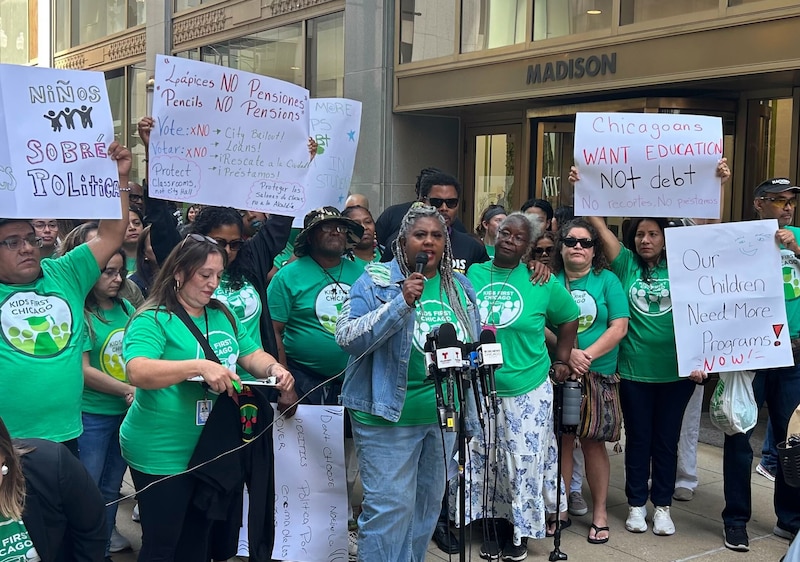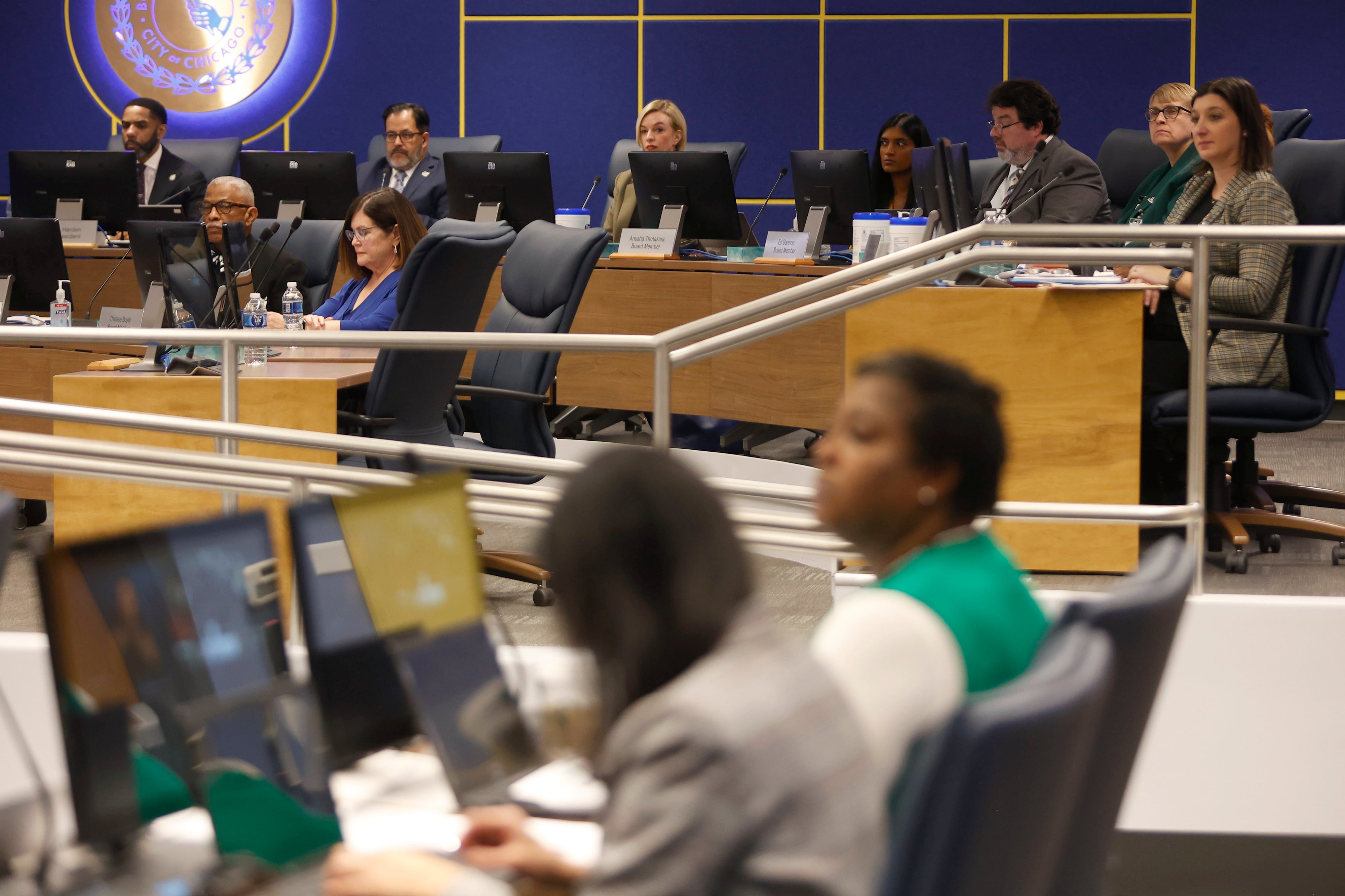Sign up for Chalkbeat Chicago’s free daily newsletter to keep up with the latest news on Chicago Public Schools.
After a long delay and intense political wrangling, Chicago Public Schools has a 2025-26 budget of roughly $10.2 billion that rejects high-cost borrowing and will only make a controversial pension payment to the city if there’s unexpected new revenue.
The Board of Education voted 12-to-7 Thursday to approve the budget put forward by interim CEO Macquline King earlier this month, despite weeks of back and forth and speculation that Mayor Brandon Johnson’s allies on the school board would amend the budget to commit to a payment to a city pension fund that covers CPS non-teaching staff in addition to city workers.
The mayor has pressed the district to make the payment and borrow, and Thursday’s vote made for a surprise repudiation from a board on which he appeared to hold sway.
Several board members appointed by Johnson or elected with backing from his allies at the Chicago Teachers Union joined other elected board members in supporting King’s original budget, which closed the district’s $734 million budget gap without a high-interest loan and without the $175 million pension reimbursement to the city.
King, who previously worked in the mayor’s office and is a former teacher and principal, is the second schools chief who has stood by a budget that refrains from short-term borrowing to balance it. Defying Johnson on the issue contributed to the firing of her predecessor, Pedro Martinez, by a Johnson-appointed board last school year.
King’s administration and its supporters on the school board argued that the district shouldn’t add to its massive debt burden that drains away hundreds of millions of dollars meant to educate students each year. At Thursday’s school board meeting, King urged the board to pass her original budget blueprint, saying it reflected extensive input from parents and vowing to continue advocating for more revenue for CPS.
“Throughout this process, I’ve been trying to block out the noise and focus on what really matters: the student experience,” she said.
But Johnson-aligned board members argued that the budget should give the district more flexibility and do right by a city facing its own fiscal woes. The city is on the hook for the pension payment under the law and had made it historically until former Mayor Lori Lightfoot started steering a portion of it to CPS — a move the CTU sharply criticized at the time as balancing the city budget at the expense of children.
Board members who supported the payment said that as the board transitions from a mayor-appointed to a fully elected school board, the district should take responsibility for chipping in to the fund.
“I think we should honor our obligation and be a good partner to the city,” said board member Michilla Blaise. “I think we should pay our fair share.”
But ultimately, opponents of King’s budget did not have the votes to block and amend it, said Ed Bannon, a Johnson appointee. Bannon bashed the budget for relying on an uncertain influx of tax revenue from the city — but ended up voting for it anyway.
“To me, this budget is not a win for either side,” he said. But, he said, “It was the best budget deal we were going to get.”
The holdouts who voted no were Olga Bautista, Karen Zaccor, Ángel Vélez, Emma Lozano, Jitu Brown, Blaise, and Norma Rios-Sierra. Member Debby Pope abstained, and board President Sean Harden only votes if he needs to break a tie.
CTU criticized King budget; support staff union backed it
The budget assumes CPS would get $379 million from a city-controlled pool of taxpayer dollars for economic development, known as surplus Tax Increment Financing, or TIF, funding. Board members who favored making the pension payment argued the city could withhold that funding from the district in retaliation if CPS did not pay. But elected board members noted that the cash-strapped city was likely to declare a large TIF surplus to help balance its own budget, and CPS would automatically receive a portion of that surplus by law.
What’s more, a majority of Chicago aldermen — including some Johnson allies — sent the board a letter Wednesday urging them to approve the budget without a loan or the pension reimbursement to city hall, saying those would be “willfully reckless financial decisions” that will hurt district students and employees.
District officials have said that the loan would lead to $175 million in interest and other costs — and a downgrade to the district’s bond rating. That would mean higher borrowing expenses in the future and paltrier savings from refinancing existing debt.
The budget also involves some $272 million in cuts, mainly to central office expenses, but also to custodial services, crossing guards, and cafeteria staff. The district refinanced some existing debt to save money and dipped into a fund set aside to help make debt payments, among other steps to address the deficit.
Despite the support staff cuts, the SEIU Local 73 — the union representing some district support staff — rallied before the board meeting in support of King’s budget. Its leaders and members argued that this was not the time to help out the city with pension payments and saddle CPS with more borrowing costs in the process. The advocacy group Kids First Chicago also held a rally calling for passage of King’s budget.

But in a press conference before the meeting and during public comment, CTU leaders and members suggested that failing to borrow could open the door to disruptive midyear cuts to district employees and programs.
Union leaders have put intense pressure on state lawmakers and Gov. JB Pritzker this summer to provide more dollars for the district. They have noted that even after a roughly $1 billion increase in state funding to CPS in recent years, the district remains about $1.6 billion short of what Illinois would consider adequately funded. By all accounts, however, more state help is not on the way this year — a position Pritzker affirmed this week.
Stacy Davis Gates, CTU’s president, said the aldermen who wrote the letter could resolve the budget impasse by committing in writing to steer $500 million in TIF funding to the district.
“The city council can be our hero,” she said. “Twenty-six of them said, ‘We’ve got you.’ Thank you. Put it in writing.”
During public comment, Eric Branholm, a pre-kindergarten special education teacher at Belmont-Cragin Elementary on the city’s Northwest Side, said the budget bakes in cuts from the summer that affected his school this fall. It lost a dual language coordinator, two custodians, afterschool programming, and some instructional materials. He said the district faces further uncertainty as the Trump administration threatens to withhold some of the district’s funding and to take over policing in the city.
“In a moment like this, you just simply cannot pass a budget that ties your hands and takes the option of borrowing off of the table,” he said.
A string of elected officials addressed the board as well. Some aldermen urged board members to redouble their efforts to lobby the state for more funding and to take on the pension payment as a district responsibility. Others cautioned against taking out a high-cost loan. State Sen. Willie Preston, a Chicago Democrat, said “absurd” borrowing to help the city with pension costs would severely undermine the district’s case for more state support.
“This proposal to take out a loan mortgages the future of the children you claim to protect,” he said.
The budget was delayed well past the July 1 start of the fiscal year because of Martinez’s departure and back-and-forth over how to close the deficit. But the board faced a deadline laid out in state law to pass it by the end of this week.
In a recent memo, CPS Chief Financial Officer Miroslava Mejia Krug had sought to reassure board members that they could approve borrowing later in the fiscal year through a simple majority vote in the case of “a true emergency.” She reiterated the concern that including a $200 million loan and the pension reimbursement to the city in the CPS budget would result in cuts to schools.
Board members say they’ll push for more funding
A day before the vote, the mayor appointed Ángel Vélez, a diversity, equity, and inclusion consultant, to a board vacancy in time to cement a majority of Johnson-aligned members. Some board members Thursday questioned whether he was prepared to vote on the budget and called on him to recuse himself from that vote.
But Vélez pushed back, and Harden censured his colleagues for what he saw as a lack of decorum.
Members on both sides of the vote said they will hold aldermen to their vow to come through with TIF funding — and will keep pushing the state to give CPS more money.
“Please keep that energy up because I am going to,” said DeBerry. “Let’s get more from the state for our children.”
Mila Koumpilova is Chalkbeat Chicago’s senior reporter covering Chicago Public Schools. Contact Mila at mkoumpilova@chalkbeat.org.





